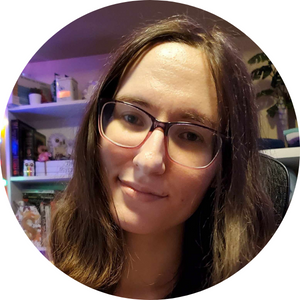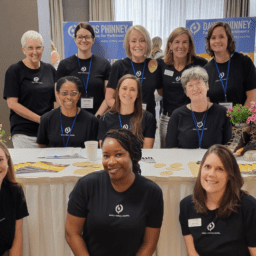Does it help women with Parkinson’s to receive their neurological care from a woman? In this video, Director of Education and Content Devon Fulford discusses this topic with members of the Davis Phinney Foundation’s women’s panel.
The panel also talks more broadly about the importance of choosing your care providers and about why it’s both surprising and not surprising that women with Parkinson’s are underrepresented in research but prominent in Parkinson’s advocacy and support groups.
An audio version of this webinar is available.
Some panelists prioritize having female neurologists and care team members as much as possible, but others have made this less of a priority. Still, there is a sense amongst the panelists that there are advantages to seeing a female provider.
Teri summarizes this: “I have had a lot of luck with [providers who are] women just being more receptive, and I am just kind of more open and willing to kind of lead with the idea that my hormones play into [my symptoms].”
While the panel doesn’t come to the conclusion that their care is always better when they see a female neurologist, they do share a similar view of traits shared by the best providers they have seen.
Providers the panelists most prefer to see are those who:
- Listen carefully
- Take all concerns seriously, even when they’ve not heard them before
- Are willing to work with their patients as partners
- Have interest in maintaining care relationships for extended timeframes
Women With Parkinson’s: The Impact of Menstruation
One factor to the quality of the panelists’ experiences as women with Parkinson’s is the impact of their menstrual cycles on their symptoms, and the way this relates to the character of the attention they receive from providers.
The panelists describe differing experiences of menstruation on their symptoms. For some, their periods coincide with a decreased intensity of symptoms. Others have the opposite experience.
Research Involving Women with Parkinson’s
The difference in how menstruation influences symptoms highlights one big problem with the limited research on women’s health and Parkinson’s. In 2019, Cerri et al. stated that research “considering female sex as a crucial variable [… is] highly under-represented” in Parkinson’s research.
Considering the variability of experiences of Parkinson’s, it is not surprising that we don’t understand the precise impacts of menstruation, menopause, pregnancy, and other aspects of women’s health on women with Parkinson’s. What is certain is that women with Parkinson’s significantly benefit from receiving care from a provider who listens to them and takes their experience seriously.
Share Your Experience With Your Care Team
Perhaps the most important reason you should see a care provider who takes your experience seriously is that if you aren’t listened to, you are less likely to share your full experience. This can result in poor care. While this is true for all people living with Parkinson’s, it can be especially significant for young women living with Parkinson’s and those navigating menopause.
Bear in mind that not every clinician regularly sees people with young onset Parkinson’s. Since women often face delay in diagnosis, it is not uncommon for a neurologist—even a movement disorder specialist—not to have seen very many pre or perimenopausal people with Parkinson’s. Because of this gap in experience, they may not consider the possible variability to effect of a menstrual cycle on Parkinson’s symptoms.
This is just one example of why it’s essential that you believe your provider will listen to you: It’s critically important to feel it’s worthwhile to share your individual experience of living with Parkinson’s.
HELP ADVANCE RESEARCH INVOLVING WOMEN WITH PARKINSON’S
In recent years, there has been an uptick of research focusing on the experiences of women with Parkinson’s. Some examples include a study supported by My Moves Matter and PregSpark. If you are a woman with Parkinson’s, consider learning more about participating in this research.
Moreover, when you visit with your care team, ask if there are opportunities for connecting with other women with Parkinson’s or if any research opportunities in your local area.
ADDITIONAL RESOURCES
Women’s with Parkinson’s Panel: Relationships
Women with Parkinson’s Panel: Self-Advocacy and More
Women and Young Onset Parkinson’s Featuring Dr. Annelien Oosterbaan
Meet the Speakers
 Karen Frank, MS, CRNA
Karen Frank, MS, CRNA
Karen retired from her beloved career as a certified registered nurse anesthetist after she was diagnosed with YOPD. Since retirement, Karen focuses on Parkinson’s advocacy–especially as it relates to young onset Parkinson’s and mental health. Karen runs a national support group for YOPD and has served as a Davis Phinney Foundation Ambassador since 2019. She is a public speaker and is actively involved in improving medical care for those living with Parkinson’s. Karen is currently working to establish a Pedaling for Parkinson’s class in her home community of Saint Louis.
 Jasmine Sturr
Jasmine Sturr
Jasmine Sturr is a 29-year-old scientist who has lived with juvenile onset Parkinson’s for the past 15 years. Initially, motor symptoms were the most troublesome, but DBS surgery in 2015 has greatly improved mobility. Secondary gastrointestinal dysmotility has been another significant challenge to manage, for which a feeding tube that bypasses the stomach–as well as a new medication called Motegrity, the only prokinetic safe for people with Parkinson’s–have been the management. Through the years, different advocacy and science projects within the sphere of patient innovation have become Jasmine’s career.
 Teri Lamers
Teri Lamers
 Sandra Chu
Sandra Chu
Sandra Chu lives in Pennsylvania, just outside of the capital of Harrisburg. She is a 35-year-old stay at home mom who previously worked for 10 years in hospital and community settings as a nurse. Sandra was diagnosed in 2020 with YOPD. Besides keeping up with her 5-year-old daughter and furry (labradoodle) son, she has found a love for riding her stationary bike and has gotten back to running, which had become difficult to do when her Parkinson’s symptoms started. Sandra volunteers at a local food pantry and has recently become a DPF Ambassador.
 Patti Burnett
Patti Burnett
Patti is from upstate New York but moved to Colorado in 1978. She and her husband, Dan, have two married daughters and four grandchildren. Patti supervised the Copper Mountain ski patrol and trained and handled avalanche and search and rescue dogs before being diagnosed with Parkinson’s in 2013. She is an Ambassador with the Davis Phinney Foundation; Dan and Patti facilitate PD SELF classes. Patti has also authored two books: Hasty! Avalanche Search (the training and care of avalanche search dogs) and Chronic Hope (God’s redeeming presence in the midst of pain), which is currently being published.
 WANT MORE PRACTICAL ARTICLES LIKE THIS?
WANT MORE PRACTICAL ARTICLES LIKE THIS?
You can learn much more about living well with Parkinson’s today through our Every Victory Counts® suite of resources. Each manual is packed with up-to-date information about everything Parkinson’s. Click the link below to reserve your manual(s).
Thank you to our 2024 Gold Partner, AbbVie, and our Silver Partner, Mitsubishi Tanabe Pharma America, for their ongoing support of these must-have manuals. Additionally, we’d like to thank Barbara and Dale Ankenman, Abby and Ken Dawkins, Bonnie Gibbons, Irwin Narter, Lorraine and J Wilson, and Gail Gitin in loving memory of Gene Gitin for their generous donations that allow us to make these resources available and accessible to all.

















